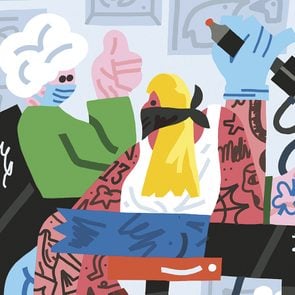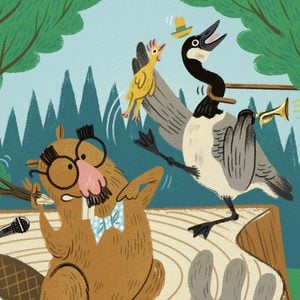How I Finally Made My Mom Laugh

In 1990, during a performance of my stage play The Bootlegger Blues at my reserve, Curve Lake First Nation in Ontario, I became fixated on one particular member of the audience. The play is a comedy about an older woman bootlegging beer to raise money for the church. While everybody else laughed, there she sat, staring at the floor, with her fingers in her ears. I’ll never forget her look of complete discomfort. That woman was my mother.
I wish I could say her reaction that evening was an isolated incident, but it was one of many I remember when I was first starting out as a playwright.
Despite the fact I’d established myself as a humorist, my mother never found me or my work particularly funny. We loved each other deeply, of course, but she was my hardest critic. “Is Drew really that funny?” she’d ask family members.
To make matters worse, the feeling was mutual: though our social circle swore that she was hilarious, I never saw it. For starters, unlike me, she never had a clever spin on world events or the state of affairs in her community. How could she be funny?
My mother was supposedly very funny in her first language, Anishinaabemowin, but alas, I didn’t speak it. One of the most intriguing characteristics of a good deal of Indigenous languages, I’ve been told, is that they’re structured for maximum hilarity. At family gatherings, when somebody would say something “funny” in Anishinaabemowin, she’d lean over and explain it to me. Sometimes the humour translated. Sometimes it didn’t.
For a while I was convinced I would never make her laugh. Then, in 2005, I succeeded. I had published a book called, of all things, Me Funny. In it were dozens of essays deconstructing Indigenous humour, along with 50 so-called “Indian jokes” to break up the various chapters. (For instance, “Why do Native people hate snow? Because it’s white and all over our land.”) They cracked her up so much she looked at me and declared, “Wow, that was funny!”
I remember being relieved—and very pleased.
In 2009, my mother passed away of a stroke at the age of 77. I was in charge of planning the funeral along with two cousins, two aunts and my girlfriend. Because my mother was a shy woman, I can guarantee she would have found our group effort quite embarrassing.
Sunflowers were her favourite, but she had had the nerve to pass away just before the Chinese New Year. Since sunflowers are seen as a symbol of good luck and prosperity, the holiday had hoovered up all the bouquets in Ontario. We opted for her second favourite: asters. She would not have been impressed.
During the funeral, amidst the tears, family member after family member got up and recounted things she had done and said over the years. To my surprise, I found myself laughing. Suddenly I remembered a moment from the early ’90s, when my mother asked me, utterly serious, what “owie” meant in French. I struggled to come up with an answer until I spelled it out in my mind: oui.
More and more stories about her surfaced. We laughed as we remembered her.
I couldn’t see my mother’s forest for my own trees. I wish I could have shared those laughs with her while she was alive, but I’m glad I finally made the connection.
Next, check out a story that perfectly captures what it’s like providing tech support for your folks.






